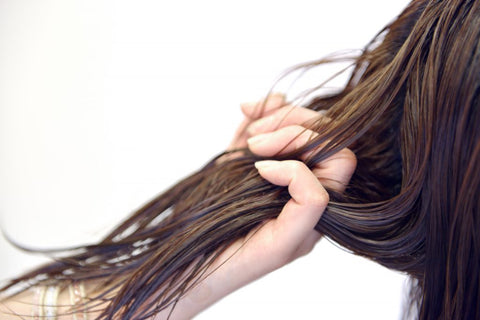March 3, 2021
Oxidative stress causes hair loss! The relationship between hair loss and oxidative stress
Although thinning hair and hair loss have an image of being a man’s problem, recently it seems that more and more women are suffering from thinning hair.
Did you know that oxidative stress is related to this thinning hair?
There are many causes of thinning hair. Among them, aging and oxidative stress can be the cause.
Hair Mechanism
The number of hairs in the body is generally said to be between 70,000 and 100,000. This number is determined when the fetus is about 6 months old, that is, when it is in the mother’s body. Therefore, when you feel like you have more hair after birth, it is not that the number of hairs is increasing, it is just that they are getting thicker.
Each hair has a lifespan of 2 to 5 years, and when it reaches its end, it will naturally fall out, but if the hair follicle stem cells at the back of the pores are functioning properly, new hair will be produced. So there is no need to worry.
However, if the hair follicle stem cells stop functioning, new hair will not be produced after the hair falls out, resulting in thinning hair.
What causes hair follicle stem cells to stop functioning?
Hair follicle stem cells are protected by collagen. However, as people age, they secrete more enzymes that break down that collagen. The cause of the increase in this annoying enzyme is oxidative stress.
Although this oxidative stress naturally increases with age, the greatest cause of increased oxidative stress is sunlight.
In other words, it is the “ultraviolet rays” contained in sunlight.
When ultraviolet rays hit the scalp, hydrogen peroxide is produced on the scalp.
Hydrogen peroxide is a potent oxidative stressor, and this oxidative stress increases the enzymes that break down collagen, destroying the collagen in the scalp. As the collagen protecting the hair follicle stem cells decreases, the follicle stem cells are gradually pushed to the surface of the scalp.
Eventually, the pores close and the hair follicle stem cells peel off along with the dead skin cells. The hair follicle stem cells are no longer there, so they are no longer functional. Once this happens, there is no way to get them back.
Measures against thinning hair problems
Recently, it has been suggested that vitamin C may be effective in treating these thinning hair problems.
In fact, vitamin C is an antioxidant and protects the skin from ultraviolet rays.
Vitamin C itself is also essential for the production of collagen. What is noteworthy is its antioxidant properties, which inhibit reactive oxygen species such as hydrogen peroxide.
Nowadays, there are hair growth sprays sold on the Internet that contain vitamin C, which is said to be effective in hair follicles. Considering the function of vitamin C, I believe that it may have a certain effect in keeping the hair and scalp in good condition.
As mentioned above, I believe that applying hair-growth products containing vitamin C and taking supplements with antioxidant properties like vitamin C are effective to some extent in preventing hair thinning.
Also, in order to minimize the damage caused by oxidative stress to the scalp, you should pay attention to your daily lifestyle so as not to raise oxidative stress.
And when you’re out and about, it’s important to wear a hat to avoid the UV rays of the sun! There used to be a phrase in a commercial that said, “Hair is a long time friend,” so let’s make a little effort every day so that it can be our friend for a long time.


